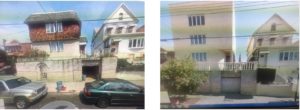
An example of a residence enlarged pursuant to a BSA-approved application in Brooklyn Community District 10 (original residence shown on the left). Image credit: Brooklyn Community Board 10
The proposed amendment would remove Brooklyn Community District 10 from applicability under Section 73-622, which the community board argues has not been used in line with its intended purpose. On August 24, 2016, the City Planning Commission held a public hearing on an application to amend the New York City zoning text relating to special permits issued by the Board of Standards and Appeals. These special permits allow property owners in R2 zoning districts to enlarge family residences beyond what is otherwise prohibited by the Zoning Resolution. Currently, Section 73-622 only applies to four of the fifty-nine Community Districts in New York City.
Under Section 73-622 of the Zoning Resolution, homeowners of one- and two-family detached and semi-detached residences can receive authorization from the Board of Standards and Appeals to increase the floor area and height of their existing homes. In considering whether to grant a special permit, Section 73-622 requires that alterations made pursuant to the section be in line with the character and nature of the surrounding area. On June 20, 2016, City Planning held a review session at which the Commission unanimously approved the application to be sent out for review by Brooklyn Community Board 10 and the Brooklyn Borough President Eric Adams. For CityLand’s past coverage on the review session, click here.
On July 28, 2016, Borough President Eric Adams held a public hearing where the majority of the speakers were supportive of the application. Subsequently, the Borough President issued a report to the City Planning Commission and the City Council recommending approval.
At the August 24th public hearing, Josephine Beckmann, district manager for Brooklyn Community District 10, testified that the special permit has in practice been predominantly used to legalize existing illegal conditions or to create luxury housing for sale or purchase. Beckmann noted that since its approval by City Planning in February 1998, all 21 special permit applications that had been submitted were approved by the Board of Standards and Appeals, even though half of those had been recommended for disapproval by Brooklyn Community Board 10.
Commissioner Larisa Ortiz asked Beckmann whether residents of Brooklyn Community District 10 who want to expand their homes for the original reasons of the section—to allow families to grow in the community—would be able to do so without the special permit under Section 73-622. Beckmann testified that alternative permits are already available to fulfill those purposes, such as Section 73-621 special permits which allows home expansion but limits it to 10 percent, and other land use variances from the Board of Standards and Appeals.
When Section 73-622 was originally adopted, Brooklyn Community Board 10 was in favor, as it felt that the special permit “would allow current residents to, in effect, ‘grow in place,’” said City Council Member Vincent Gentile, the representative for Brooklyn Community District 10. “Yet, over the years it has become clear to me and to the members of the Board that this provision, in reality, has more often been used by speculators and investors and new buyers of property within Community Board 10 to add bulk immediately upon the purchase of a property or to make legal an illegally converted space. . . . It has become evident that the misuse of the special permit has been intentional and repeated.”
Currently, there are four special permit applications submitted under Section 73-622, which are either pending before or have been approved by the Board of Standards and Appeals. Council Member Gentile assured City Planning that he is preparing a zoning text amendment that would vest these four applications so that the four applicants may still rely on the current permits.
The City Planning Commission is set to vote on the application in the coming weeks.
CPC: Brooklyn Community Board 10 Text Amendment (N 160377 ZRK) (Aug. 24, 2016).
UPDATE: On September 21, 2016, the City Planning Commission voted 11-0 to approve the amendment to the Zoning Resolution. In its report, the Commssion agreed with Community Board 10 and Council Member Gentile that subsequent rezoning in 2005 and 2007 had made the Special Permit in question unnecessary.
By: Jonathon Sizemore (Jonathon is the CityLaw Fellow and a New York Law School Graduate, Class of 2016)

